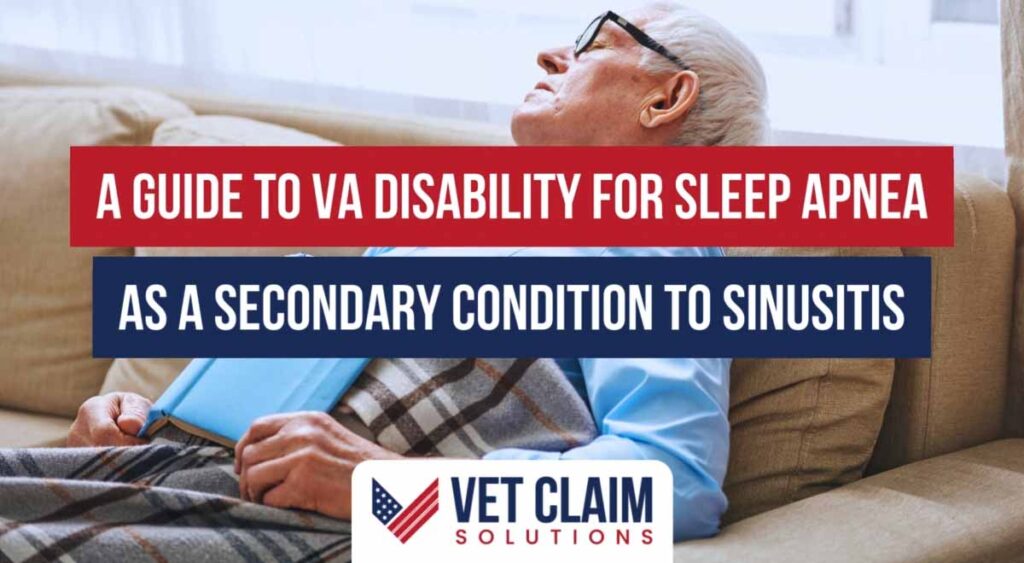Veterans seeking VA disability for sleep apnea secondary to sinusitis often face a complex claims process. Understanding the connection between these two conditions and how to navigate the VA system is crucial for securing the benefits you deserve. Sleep apnea, a disorder that disrupts breathing during sleep, can be significantly impacted by sinusitis, which causes inflammation in the nasal passages. This relationship between sleep apnea and sinusitis can form the basis for a secondary service connection claim with the VA. Many veterans don’t realize that their sleep apnea may be linked to their service-connected sinusitis. The VA recognizes this connection, but proving it requires specific evidence and understanding of the rating criteria. Whether you’re just starting your claim for VA disability for sleep apnea secondary to sinusitisl, knowing the ins and outs of the process can make a significant difference in the outcome of your case.
Understanding the Link Between Sleep Apnea and Sinusitis
Sleep apnea and sinusitis are more closely related than you might think. Sinusitis can contribute to sleep apnea by causing nasal congestion and inflammation that obstructs airflow. This obstruction can lead to or worsen existing sleep apnea symptoms. A study published in the Journal of Clinical Sleep Medicine found that nasal obstruction is prevalent in patients with obstructive sleep apnea (OSA), with 70% of the study group displaying significant nasal blockage. This research highlights the strong connection between sinus issues and sleep disorders. Additionally, chronic sinusitis can lead to the formation of nasal polyps, which further obstruct airflow and exacerbate sleep apnea symptoms. The relationship between these conditions creates a cycle where each can worsen the other, making it crucial for veterans to address both issues when seeking VA disability benefits.
Qualifying for VA Disability for Sleep Apnea Secondary to Sinusitis
To qualify for VA disability benefits for sleep apnea secondary to sinusitis, veterans must meet specific criteria:
1. Have a current diagnosis of sleep apnea, confirmed by a sleep study.
2. Have a service-connected diagnosis of sinusitis.
3. Provide medical evidence linking your sleep apnea to your service-connected sinusitis. It’s important to note that the VA requires a sleep study to confirm a sleep apnea diagnosis. Without this crucial piece of evidence, your claim may be denied regardless of your symptoms.
VA Rating Criteria for Sleep Apnea and Sinusitis
Understanding how the VA rates sleep apnea and sinusitis is essential for navigating your claim. The VA uses specific diagnostic codes and criteria to assign disability ratings for these conditions.
Sleep Apnea Ratings
Sleep apnea is rated under 38 CFR § 4.97, Diagnostic Code 6847. The ratings are as follows:
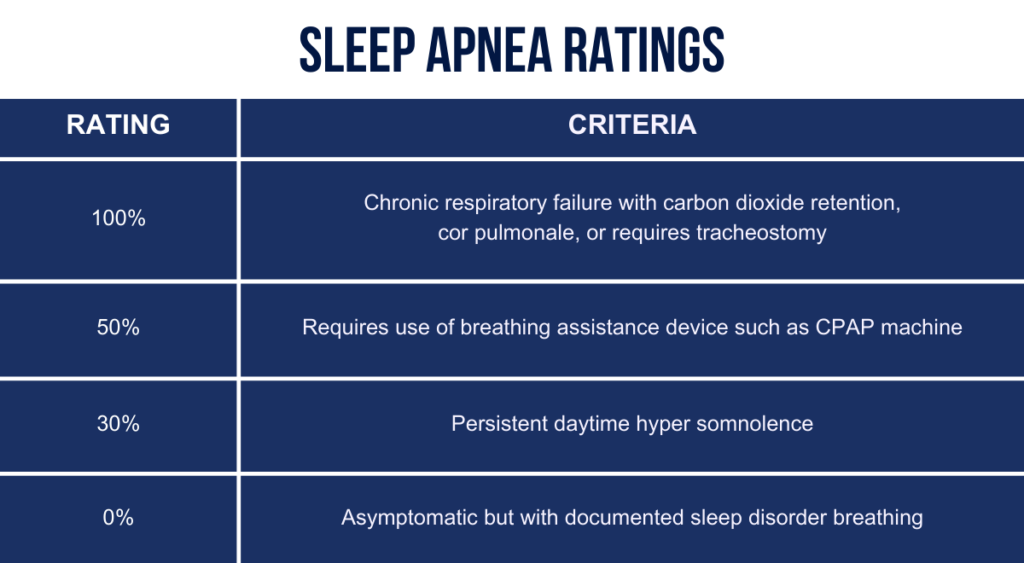
Sinusitis Ratings
Sinusitis is evaluated under 38 CFR § 4.97, Diagnostic Codes 6510-6514. The ratings are:
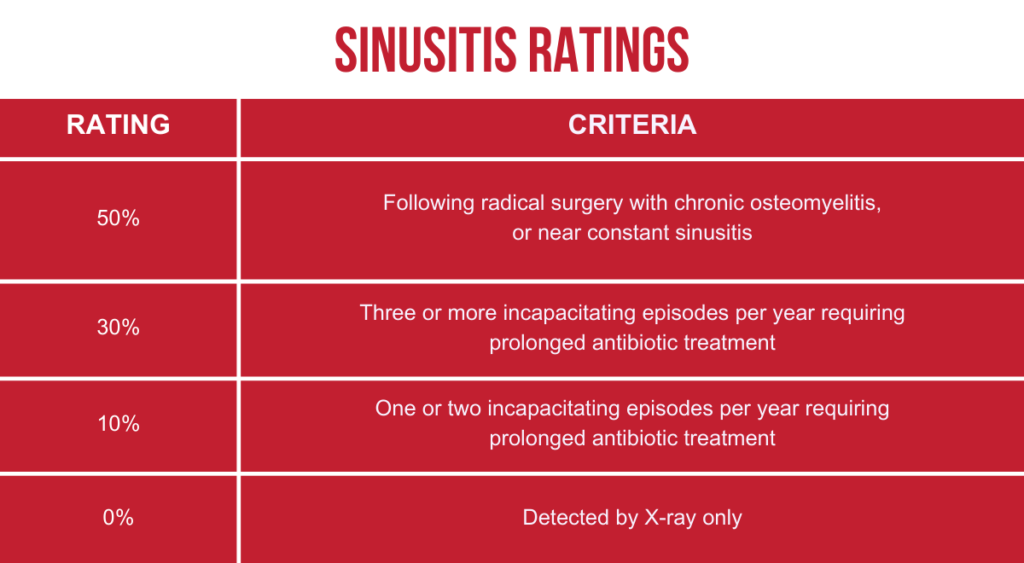
The Importance of Medical Evidence in Your Claim
When filing for VA disability for sleep apnea secondary to sinusitis, strong medical evidence is crucial. This evidence should include:
1. Medical records documenting your sinusitis diagnosis and treatment.
2. A sleep study confirming your sleep apnea diagnosis.
3. A medical opinion or nexus letter from a healthcare provider explaining how your sinusitis contributes to or aggravates your sleep apnea. A well-written nexus letter can significantly strengthen your claim. It should clearly state that your sleep apnea is “at least as likely as not” caused or aggravated by your service-connected sinusitis.
Navigating the VA Claims Process
Filing a claim for VA disability for sleep apnea secondary to sinusitis involves several steps:
1. Gather all relevant medical records and evidence.
2. Complete and submit VA Form 21-526EZ.
3. Attend any Compensation and Pension (C&P) exams scheduled by the VA.
4. Be prepared for HLR if your claim is denied. Remember, the claims process can be lengthy and complex. Patience and persistence are key, as is seeking help when needed.
Common Challenges and How to Overcome Them
Veterans often face several challenges when seeking VA disability for sleep apnea secondary to sinusitis:
1. Lack of a sleep study: Ensure you undergo a sleep study to confirm your diagnosis.
2. Insufficient medical evidence: Work with your healthcare providers to document the connection between your sinusitis and sleep apnea.
3. Denial of service connection: If your sinusitis isn’t service-connected, you may need to first establish that connection.
4. Inadequate C&P exams: If you feel your C&P exam was inadequate, you can request another or submit additional evidence.
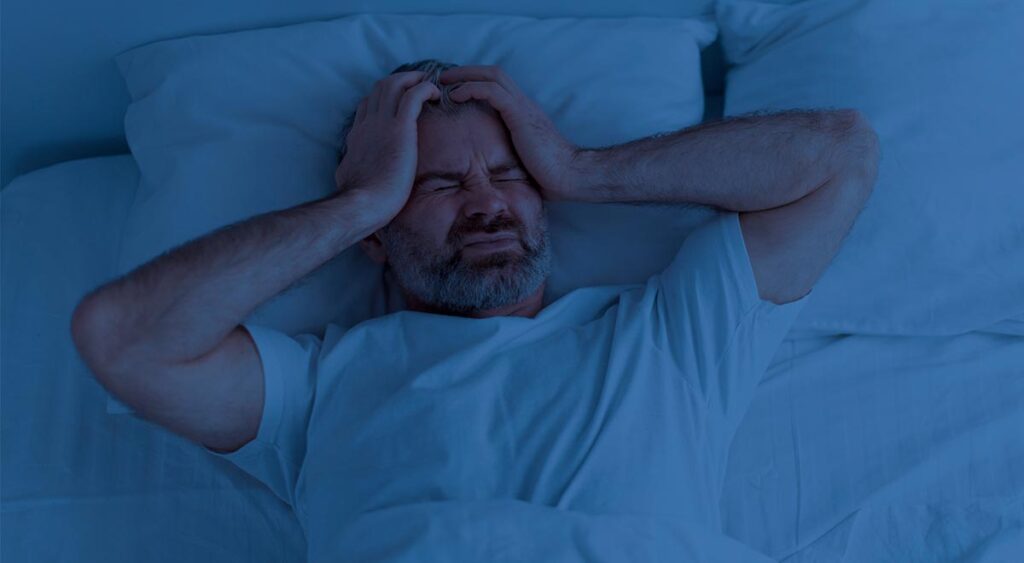
The Impact of Sleep Apnea on Veterans’ Lives
Sleep apnea can significantly impact a veteran’s quality of life. It’s not just about snoring or feeling tired. Sleep apnea can lead to serious health issues, including:
– Increased risk of heart disease and stroke
– High blood pressure
– Type 2 diabetes
– Depression and anxiety
– Cognitive impairment
These impacts underscore the importance of seeking proper diagnosis, treatment, and VA disability benefits. Many veterans may not realize they have sleep apnea. In fact, one study found that more than half of veterans tested positive for sleep apnea without having a prior diagnosis.
Treatment Options for Sleep Apnea and Sinusitis
While pursuing VA disability for sleep apnea secondary to sinusitis, it’s crucial to seek appropriate treatment for both conditions. Treatment can improve your quality of life and potentially strengthen your VA claim. For sleep apnea, common treatments include:
– Continuous Positive Airway Pressure (CPAP) machines
– Oral appliances
– Lifestyle changes like weight loss and positional therapy
– In some cases, surgery may be recommended
For sinusitis, treatments may include:
– Nasal corticosteroids
– Saline nasal irrigation
– Antibiotics for bacterial infections
– In chronic cases, endoscopic sinus surgery it’s important to work closely with your healthcare providers to find the most effective treatment plan for your specific situation.
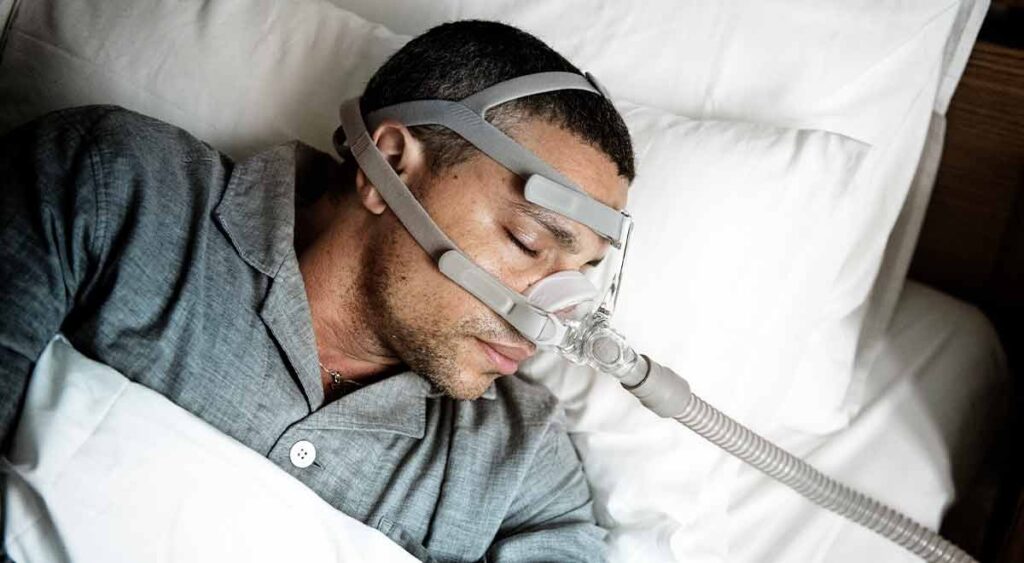
Conclusion
Securing VA disability for sleep apnea secondary to sinusitis can be a challenging process, but understanding the connection between these conditions and how to navigate the VA system can significantly improve your chances of a successful claim. Remember, the key elements are a confirmed diagnosis, strong medical evidence linking your sleep apnea to your service-connected sinusitis, and persistence throughout the claims process.
If you’re struggling with sleep apnea and believe it’s related to your service-connected sinusitis, don’t hesitate to seek help. Experts like Vet Claim Solutions specialize in assisting veterans with complex claims and can provide valuable guidance and support. With the right approach and evidence, you can secure the VA disability benefits you’ve earned through your service.


